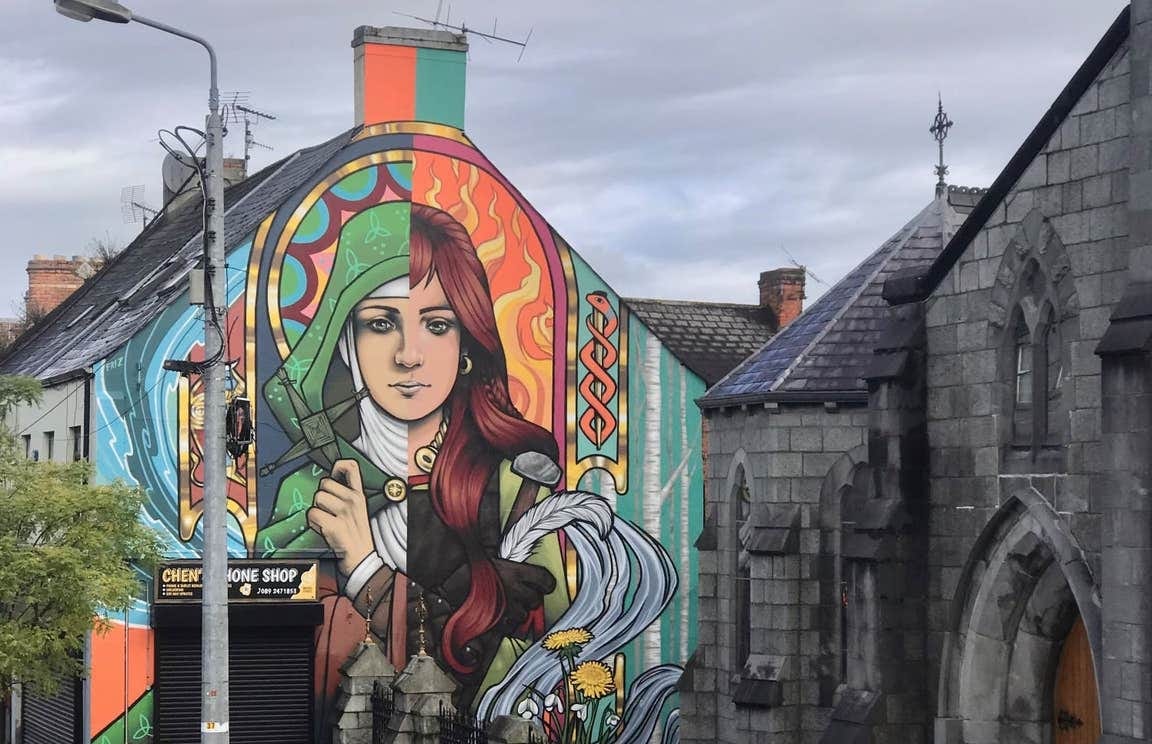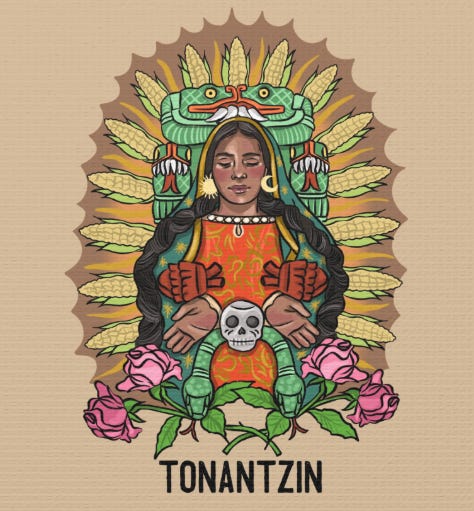
Dear Beloved,
January was a month of tragedy: Parents stolen from their children, planes crashing, public health data and research deleted, federal funding threatened, obedience demanded. It is not the end - we are far from that - but is by no means the beginning. This was set in motion before you or me or our grandparents were born. Despite what those in illusive power may dictate, there is no going back.
We stand between the winter solstice and the spring equinox, in the balance between the old world and the new. Today is about hope in long, cold winters and uncertainty. Today is celebration of spring’s promise.
February 1st was Imbolc. It was the Day of St. Brigid. It is the beginning of spring. It’s the feast day for Ireland’s patroness saint. It is only a short way between the darkest day and the returning of the light. Neither beginning nor end, no either/or, no binary.
The torch has been passed down by ancestors, martyrs, memory keepers, beloveds. Now we are the carriers of the flame.
“Ireland may he regarded as the earliest English colony and one which, by reason of her proximity, is still governed in exactly the same old way; here one cannot fail to notice that the English citizen’s so-called freedom is based on the oppression of the colonies.” - Friedrich Engels in a letter to Karl Marx, 1856
Imbolc is a modern-day celebration unearthed from buried Celtic traditions. The word itself comes the Old Irish language, and it means “in the belly of the Mother” - the pregnancy of ewes, the stirring of seeds, the coming birth of spring. It celebrates the Brigid of the Tuatha Dé Danann, the goddess of childbirth, smiths, and poets. Of hearth and fire.
Then came Christianization.
After his kidnapping and enslavement in Ireland, the now-sainted Patrick escaped just to return to the island after his theological studies. He felt tasked by a divine calling to “save the barbaric people” from their Indigenous traditions. Speaking the language, familiar with Celtic culture and traditions, Patrick assimilated enough to convert Celtic people.
“While he often forged connections and friendships among the Irish, Patrick had to travel to each chief and preach the Christian doctrine, hoping they would comply with its teachings,” recounts Thomas Martz in The Adoption of Christianity by the Irish and Anglo-Saxons: The Creation of Two Different Christian Societies. “If they did not, he would often adjust his teaching to echo pagan traditions until a tribe converted voluntarily.”
Afterward, Celtic traditions and spiritual teachings were enfolded into Roman Catholicism: Jesus’s birthday shifted from spring to winter. Samhain and Miccailhuitl enfolded into All Saints Day. Gods survived imperialism by demotion to sainthood.
The goddess of fire and poets became a girl from Kildare, canonized as a saint of dairymaids and cattle.
The tactics popularized by St. Patrick became popular methods for proselytizing: learn the language, know enough of the customs, bring something useful - a resource, healthcare, schooling - live in the community as their “savior,” and then dismantle from within and subsume it into Western Christian imperialism.
Centuries after Brigid, Tonantzin metabolized into the Virgin of Guadalupe. The Nahua man Cuauhtlatoatzin allegedly witnessed a Marian vision on Mount Tepeyac—where Tonantzin had been worshipped for thousands of years—and was told by the apparition in Nahuatl to build a place of worship there. Cuauhtlatoatzin himself became St. Juan Diego, the first Indigenous person from Turtle Island to become canonized and assigned as patron saint of all Indigenous people in the so-called Americas.
As imperialism cast its long shadow over the world, gods were swallowed whole by supremacy culture and so, too, were our languages, stories, medicines, and indeed many of our people.
In recent times, people have taken the concept of saints and chosen figures from their own communities to venerate. Folk saints exist outside of institutional canonizations and by extension, their control. Other times, folk saints walk side-by-side with institutions so as to stay close to their people. In either case, they thrive - becoming more powerful than what systems would ever allow - and remain active in their communities where they strengthen movements.
They are Sarita Colonia, a Peruvian woman who moved to Lima for better work and to escape poverty; after she died, she became venerated by people in poverty, taxi drivers and bus drivers, LGBTQ people seeking comfort, and immigrants. The Iwa that followed Dahomey people across the Middle Passage and associated with Catholic saints, are still with the Haitian diaspora - Ezili Freda, lwa of love and luxury, as Mater Dolorosa and Papa Legpa as St. Peter. Hermano Pule, defying the Catholic Church’s racial discrimination and Spanish colonial forces in the Philippines to worship God. Escrava Anastacia, a woman enslaved and brought to Brazil who still provides comfort to her followers there. Sepé Tiaraju, a man of the Guarani tribe who fought against the Portuguese and Spaniards who is still remembered for his battle cry, “This land has owners!”

Writing Prompt
What old gods have followed your ancestors, and what teachings do you carry forward? What is it that you want to unearth and reclaim? What are you and your kin creating together for future generations?
Mutual Aid: Project Rainbow Turtle
Project Rainbow Turtle is an Indigenous LGBTQ+ centered mutual aid fund and network that provides direct financial assistance, support, and resources to our 2-Spirit and Indigenous LGBTQ+ Relatives within the so-called United States.
This mutual aid fund will assist our 2-Spirit and Indigenous LGBTQ+ Relatives with the following: Name change fees; passports; FFS; laser hair removal; transition-specific clothing (binders/tucking garments), make up, and wigs; travel expenses related to accessing gender affirming care, such as ceremonies; and relocation assistance.
Seeds for Change
Read “How Ireland served as a laboratory for the British empire” by Irish historian Jane Ohlmeyer. While you’re at it, check out her book Making Empire from your local library and watch her lecture “Ireland, Empire & the Early Modern World,” in which she traces modern-day imperialism to Britain’s occupation of Ireland.
Don’t let bigots erase trans beloveds. Download, print, and distribute Decolonizing Gender: A Curriculum, a zine created by khari jackson and Malcolm Shanks.
Guide children to be a good ancestor with this lesson plan.
These are difficult times and when things get hard, we need to come together more than ever. This also means that many people will seek out a spiritual community or look to others for new wellness practices. Unfortunately, there opportunists looking to profit off others’ fear and need for community. Check out
’s helpful guide: Red Flags to Look For in The Spiritual and Wellness Spaces (and performative activism).Plant native seeds this spring.
Read ”Reclaiming Our Indigenous European Roots” by Lyla June Johnston (Diné/Tsétsêhéstâhese/European descendant).
Set up a public altar as place of resilience, grief, and connection for your community.
Gather beloveds and celebrate the coming of spring together with seed bread.
Book Launch: We Do Not Need Permission to Rise
Today’s the day! Joining the works of Beloved trans and queer artists, my poems “Where We’ll Plant Lavender” and “Silver Coronation” can be read in We Do Not Need Permission to Rise: LGBTQ+ Poetry & Art Anthology, edited by Tyler Hurula and Sage Herrin.
Published by trans-owned independent press Beyond The Veil Press, portions of this anthology will be donated to the San Diego LGBT Community Center.
🌱 Miss an issue of seedgiver? Read past newsletters here.
🌱 Loving seedgiver? Share it with your pod.
🌱 Questions? Email aleksanderaleksander@substack.com
🌱 Help me survive late-stage capitalism and create more art. Become a paid subscriber or make a one-time gift here.
🌱 Get updates on my projects and say hi at aleksanderaleksander.com.








